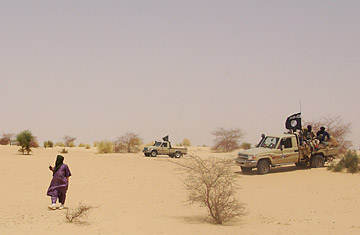
Fighters from Islamist group Ansar Dine stand guard during the handover of a Swiss female hostage for transport by helicopter to neighboring Burkina Faso, at a designated rendezvous point in the desert outside Timbuktu, Mali Tuesday, April 24, 2012. Two main groups now appear to be competing to govern northern Mali: Ansar Dine, which wants to see Sharia law brought to Mali, and separatist rebels who already have declared an independent state.
Ali Cissé, 30, a shopkeeper, couldn't contain his curiosity when a new wave of gunmen rolled into town. Outside the governor's compound in downtown Gao — a dusty administrative center of adobe architecture and open skies — he saw a fleet of armored vehicles with foreign fighters standing guard. "I saw [militants] from Niger, Pakistan, Algeria, Mauritania [and] Tunisia," Cissé tells TIME by phone from northern Mali. "I identified them by their accents because they like approaching people... to try to win their [sympathy]." Whatever their provenance, the fighters had one thing in common: they rode with Ansar Eddine, a group at times almost indistinguishable from al-Qaeda in the Islamic Maghreb (AQIM), the regional terror franchise.
Ever since a motley combination of Tuareg separatists and Islamic supremacists swept through northern Mali in a blaze of gunfire, an echo-chamber of rumor, gossip and misinformation has supplanted hard facts, and it's worth treating all information — however credible the source — with caution. But it isn't just Cissé claiming that foreign Islamic militants are flocking to this latest of troublespots. In the fabled waystation of Timbuktu, 300 miles upriver from Gao, a tour guide called Buba tells TIME that "Algerian nationals" are prevalent among the armed groups controlling the city. Taken with other reported sighting of foreign Islamist supremacists arriving in northern Mali, it's one of a number of signs that will have al-Qaeda watchers wondering whether northern Mali is becoming a new jihadist playground — even as the U.S. and its allies move against al-Qaeda in the Arabian Peninsula and a relentless drone campaign batters the badlands of Pakistan's Northwest frontier.
If Cissé kept a diary, it would provide a troubling record of the power struggle between secular Tuareg separatists and a host of religiously-inspired militants seeking to impose Shar'ia across the region. The day after Cissé saw holy warriors in downtown Gao, the 30-year-old shopkeeper says he picked his way through a military base that until recently housed U.S. special forces training the Malian army — but has now been laid waste by the various armed groups that have seized northern Mali. The next day, protesters took to the streets of Gao chanting, "Down with Ansar Eddine and the MNLA" — the initials of the secular group vying with the Islamists for supremacy and blamed for the prevailing lawlessness. On Wednesday, May 16, Cissé says that "sporadic gunfire" continued as the Islamists and gunmen from the MNLA dispersed crowds by firing over them.
The heightened tensions have provided the backdrop to fraught negotiations between the MNLA and Ansar Eddine as they try to hammer out a power-sharing agreement. Although claims in the Algerian daily El Watan that the MNLA had effectively capitulated to its Islamist fellow travelers drew a fiery rebuke, the fact remains that the MNLA will have to make some awkward compromises to accommodate its Islamists rivals and avoid a fratricidal scramble for power.
But even then, there is little reason to suspect the Ansar Eddine leader Iyad ag Ghali, an opportunist with a voracious appetite for power, will be content with a deal he will almost certainly believe is beneath him. Ag Ghali has already outraged mainstream Tuareg sentiment by colluding with al-Qaeda in the Islamic Maghreb so extensively that two of the four most visible members of his organization are known AQIM operatives: Omar Hamaha and Senda Ould Boumama. His regular appearances with senior al-Qaeda emirs, meanwhile, have helped him project a sense of power beyond his actual military capacity. To cap it all, feverish speculation among AQIM's leadership (which is mostly Algerian) that its rank-and-file has been infiltrated by agents from the intelligence service of Mauritania (the country that provides most of its recruits). That has reportedly led senior emirs to start directing wannabe jihadists ag Ghali's way.
None of this constitutes an immediate threat to the U.S., analysts reckon. But with the last U.S. troops in Mali departing soon because of the continuing political turmoil in Bamako, the horse-trading between the Tuareg mainstream and ag Ghali over the next few days could determine whether Mali joins the unfortunate docket of countries inadvertantly providing sanctuary for international terrorism.
